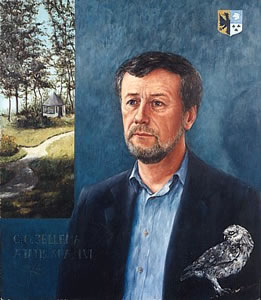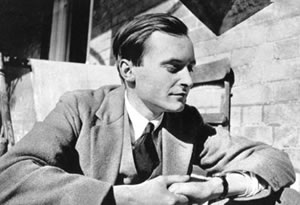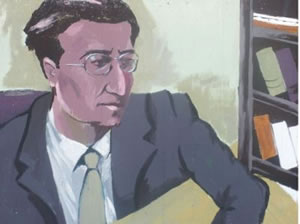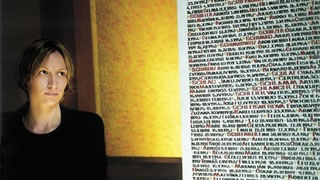De Nederlandse dichter, essayist en germanist C. O, Jellema werd geboren op 9 september 1936 in Groningen. Zie ook alle tags voor C. O. Jellema op dit blog.
November
Geen mens gezien vandaag, wel
waren de novemberluchten hier weer
spectaculair, plakkaatverfwolken
zwart met kieren felle zon als
laserstralen de vuilwollen schapen
wittend op he hardgroen gras,
de Kunst der Fuge opgezet, Tatjana
Nikolajeva op de coverfoto net een
oude pianojuf die voorspeelt hoe,
aan grootmoeder, stokdoof, ze hield
de hoorn aan haar oor, stak mij
de toeter toe, vertel me wat, het kind
dat -ik- haar kamer binnenkwam
en niets opeens had te vertellen,
daar doet ze me aan denken, had,
als je was langsgekomen, ik
zoiets verteld of zouden wij
de diepte in gedoken zijn, essenties
in het gesprek al formulerend hebben
blootgelegd, omvangt denk ik wel eens
hetgeen uit zicht verdween, al wat
ooit heeft geleefd, een eindeloos
en telescopisch onbespied geheugen
als ruimte waarin het heelal uitdijt,
de megabytes van wie we noemen God,
dat jij zo denkt zit in je genen
zeg je misschien, is niet dood,
voor dove oren zwijgt een kind en denkt
aan stekelbaarsjes in de gracht,
gedachten lijken ook toch op muziek,
zo’n fuga van gemis met contrapunt
van toen je niet besefte hoe je leefde, wel
die kleine kunst verstond en in
kon slapen met de visjes ademhappend
in een weckfles naast je bed, de band
raakt zo wel vol vrees ik, toch goed
dat je je antwoordapparaat hebt
aangezet, haast of je me nu hoort,
ik was nog wakker, zie je, met die storm
om huis, ik houd niet van november, niet
van nachten op
Muggen
Vragen gelieven zich af: voegt onze liefde
iets toe aan de liefde? – zo houdt
de vrucht van een schoot het danige
doodgaan in stand –
Iets verdroomt zich in ons,
iets wil het lukraak, iets
overleeft het, zoals
boven vannacht gevallen, nu
in de middagzon smeltende sneeuw
die wolk
dansende muggen,
een beeld maar, lichter
dan lichaam kan zijn.

Portret door Jacqueline Kasemier, 1993
De Engelse schrijver Edward Falaise Upward werd geboren in Romford op 9 september 1903. Zie ook alle tags voor Edward Upward op dit blog.
Uit: No Home But the Struggle
„I have arrived home for good at last. There will never again be a morning now when I shall say to myself here: ‘Tomorrow the guillotine descends. Tomorrow I must return to London and to my job as a teacher.’ Until I die or until I am kept in bed by a serious illness I shall be able every day after breakfast to come into this pleasant white and yellow room which is still called the ‘drawing-room’ both by me and Elsie just as it was by my parents before us and my grandparents before them; I shall be
able to look through the large panes of the French window at the verandah and the lawn and the flint wall beneath the holly tree where on fine days an oblong of sunlight is reflected as now from one of the other windows of this house, or to sit out on the verandah in spring and autumn when the weather is neither too cool nor too warm; and every day I shall be free to write poetry. But in spite of my having retired from teaching more than a month ago I still can’t easily believe that the life I have always wanted to live has become fully possible for me at last. I don’t seem even to have convinced myself absolutely that I am not due back in London for the beginning of the Easter term. At nights I still dream fairly often that I am in school, though the type of nightmare I’ve had recently hasn’t been quite as bad as the type I recurrently had during my years of teaching: then, long after I’d ‘matured’ as a teacher and did not have serious ‘disciplinary’ difficulties any more, I used to dream I was standing powerless poetically there was something consoling and pleasurable about it, and this was so also whenever in the following week before the end of the summer holidays the thought of her caused me to in the middle of a crowd of boys who had got outrageously out of control; whereas during the past few weeks I’ve dreamt three or four times that I am hurriedly going up a concrete staircase to take a class I am disgracefully late for, and when I eventually reach the classroom I find there are no boys in it – or only a few, who drift out as soon as I begin to speak to them. Perhaps I must expect such lesser nightmares for a while yet after more than thirty years in a job which, however honourable and necessary it may be, cannot in present conditions be without heavy strain even for teachers far more capable than I ever was.“

Edward Upward (9 september 1903 – 13 februari 2009)
In de jaren 1930
De Italiaanse dichter en schrijver Cesare Pavese werd geboren in Santo Stefano Belbo op 9 september 1908. Zie ook alle tags voor Cesare Pavese op dit blog.
Deola’s Return
I’ll turn round in the street and look at the passers-by,
I’ll be a passer-by myself. I’ll learn
how to get up and lay aside the horror
of night and go out walking as I used to.
I’ll apply my mind to work for a time,
I’ll go back there, by the window, smoking
and relaxed. But my eyes will be the same,
my gestures too, and my face. That empty secret
that lingers in my body and dulls my gaze
will die slowly to the rhythm of the blood
where everything vanishes.
………………………………………I’ll go out one morning,
I won’t have a house any more, I’ll go out in the street;
the night’s horror will have left me;
I’ll be frightened of being alone. But I’ll want to be alone.
I’ll look at passers-by with the dead smile
of someone who’s beaten, but doesn’t hate or cry out,
for I know that since ancient times fate –
all that you’ve been or will ever be – is in the blood,
in the murmur of the blood. I’ll wrinkle my brows
alone, in the middle of the street, listening for an echo
in the blood. And there’ll be no echo any more,
I’ll look up and gaze at the street.
Vertaald door Margaret Crosland

Cesare Pavese (9 september 1908 – 27 augustus 1950)
Muurschuldering door Fuad in Santo Stefano Belbo
De Tsjechische schrijfster Hana Androníková werd geboren op 9 september 1967 in Zlín. Zie ook alle tags voor Hana Androníková op dit blog.
Uit: The sound of the sundial
„By the early 1930s, the Baťa company had branches on three continents. Expansion while the world was in crisis. Worldwide, companies were going bust one after another, unemployment and poverty loomed, and Baťa was hiring new people by the dozen. They called themselves Baťa’s young men. They spread out across America, Asia and Africa, heading for exotic regions, primeval forests and jungles, in order to raise modern industrial cities out of nowhere.
He was sorting out the final details before his departure. Maps, books and guides. A visit to the hospital. Jarda Bartošík had him examined from head to toe and showered him with warnings: beware of the water, don’t eat raw vegetables, take quinine every morning to guard against malaria. Have you seen a dentist? No? So get that done as well.
And then the immunisation certificates: typhus, typhoid, dysentery, cholera, smallpox.
Copies of deeds for the construction sites and his papers of accreditation. Sunglasses. Late in the afternoon, he was standing in a group of twenty-somethings handing out his final instructions.
“Check your passports, medical certificates and all your other papers. Don’t forget your medicines. Any questions?”
One of the young men hesitated. Then he put up his hand like in school.
“Yes. I – the thing is, I’ve got all my papers and certificates, but – I don’t speak a word of English.”
The others burst out laughing. Thomas didn’t even blink.
“Then don’t forget to take a dictionary. Anything else?”
On the way home he couldn’t dispel his fear. He wasn’t afraid for her. He knew that she would cope without him, but he didn’t know how he would cope himself. She had dinner waiting.
“When do you leave?”

Zie voor nog meer schrijvers van de 9e september ook mijn vorige blog van vandaag.
